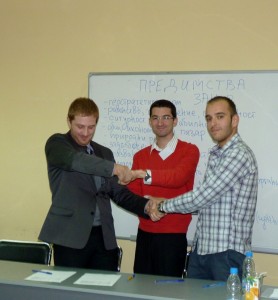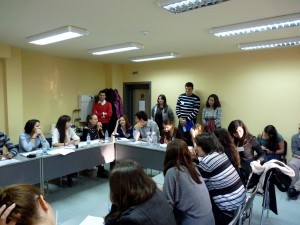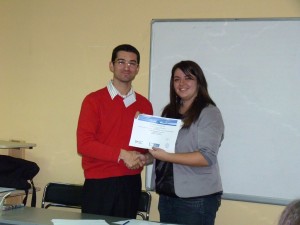
On Saturday (10 November) IRRSA carried out a simulation on “EU enlargement process towards the Western Balkans”. This initiative was realized thanks to Institute for Social Integration (ISI), which is the Bulgarian partner in the project “Get on board! Mobilizing young leaders to support the EU enlargement process towards the Western Balkans”, financed from foundation “Conrad Adenauer”. Students from different universities took part in the simulation (UNWE; NBU; SU).

On 8 November was organized a preparation meeting where everyone was told about the advantages and problems of the candidate members (Serbia; Macedonia; Montenegro), and about the functions of the European parliament, European commission and the Council of Europe. Then all the participants received their roles and tactics. All this was made so the meeting could go smoothly.
The simulation began in the morning of 10 November with an official statement of the chairman of the European commission. In a while the representatives of the three institutions, the delegates of the three Balkan counties and the journalists who watched closely the whole process of expanding of the EU to the Western Balkans began to work.
After the delegates of Serbia, Macedonia and Montenegro introduced their requests of membership in the Council of Europe they had to defend their right to be a part of the big European family by answering some provocative questions. The unconditional position of Serbia: “Kosovo is not an independent country” was one of the main reasons why the county was not accepted as member of the EU. Macedonia also had issues and was not accepted. The representatives of Montenegro achieved better results. They made sure to show the growth in the economical sector in the last years, the anti-corruption measures, the ethnical peacekeeping and the willing for good relations with the neighbour countries.

The simulation ended by signing a contract, by which Montenegro received a statute of a member-country of the EU. After that the moderators gave certificates to all who took part for their successful participation in the simulation.
 On Saturday (10 November) IRRSA carried out a simulation on “EU enlargement process towards the Western Balkans”. This initiative was realized thanks to Institute for Social Integration (ISI), which is the Bulgarian partner in the project “Get on board! Mobilizing young leaders to support the EU enlargement process towards the Western Balkans”, financed from foundation “Conrad Adenauer”. Students from different universities took part in the simulation (UNWE; NBU; SU).
On Saturday (10 November) IRRSA carried out a simulation on “EU enlargement process towards the Western Balkans”. This initiative was realized thanks to Institute for Social Integration (ISI), which is the Bulgarian partner in the project “Get on board! Mobilizing young leaders to support the EU enlargement process towards the Western Balkans”, financed from foundation “Conrad Adenauer”. Students from different universities took part in the simulation (UNWE; NBU; SU).
 On 8 November was organized a preparation meeting where everyone was told about the advantages and problems of the candidate members (Serbia; Macedonia; Montenegro), and about the functions of the European parliament, European commission and the Council of Europe. Then all the participants received their roles and tactics. All this was made so the meeting could go smoothly.
The simulation began in the morning of 10 November with an official statement of the chairman of the European commission. In a while the representatives of the three institutions, the delegates of the three Balkan counties and the journalists who watched closely the whole process of expanding of the EU to the Western Balkans began to work.
After the delegates of Serbia, Macedonia and Montenegro introduced their requests of membership in the Council of Europe they had to defend their right to be a part of the big European family by answering some provocative questions. The unconditional position of Serbia: “Kosovo is not an independent country” was one of the main reasons why the county was not accepted as member of the EU. Macedonia also had issues and was not accepted. The representatives of Montenegro achieved better results. They made sure to show the growth in the economical sector in the last years, the anti-corruption measures, the ethnical peacekeeping and the willing for good relations with the neighbour countries.
On 8 November was organized a preparation meeting where everyone was told about the advantages and problems of the candidate members (Serbia; Macedonia; Montenegro), and about the functions of the European parliament, European commission and the Council of Europe. Then all the participants received their roles and tactics. All this was made so the meeting could go smoothly.
The simulation began in the morning of 10 November with an official statement of the chairman of the European commission. In a while the representatives of the three institutions, the delegates of the three Balkan counties and the journalists who watched closely the whole process of expanding of the EU to the Western Balkans began to work.
After the delegates of Serbia, Macedonia and Montenegro introduced their requests of membership in the Council of Europe they had to defend their right to be a part of the big European family by answering some provocative questions. The unconditional position of Serbia: “Kosovo is not an independent country” was one of the main reasons why the county was not accepted as member of the EU. Macedonia also had issues and was not accepted. The representatives of Montenegro achieved better results. They made sure to show the growth in the economical sector in the last years, the anti-corruption measures, the ethnical peacekeeping and the willing for good relations with the neighbour countries.
 The simulation ended by signing a contract, by which Montenegro received a statute of a member-country of the EU. After that the moderators gave certificates to all who took part for their successful participation in the simulation.
The simulation ended by signing a contract, by which Montenegro received a statute of a member-country of the EU. After that the moderators gave certificates to all who took part for their successful participation in the simulation.
